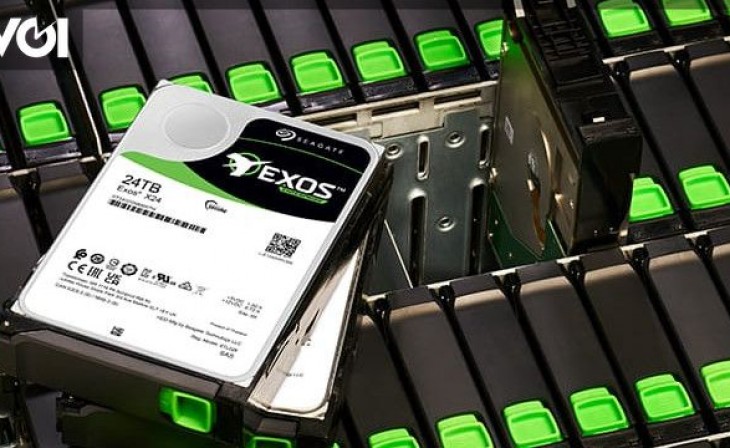Seagate announces 24TB Exos X24 hard drives, awaiting HAMR models over 30TB
The Seagate Exos X24: A Leap in Storage Capacity
The Seagate Exos X24 hard drives are the latest addition to Seagate's Exos family, known for its high-performance and reliability. These drives are designed to cater to the needs of enterprise customers, data centers, and businesses that require massive storage capacities to handle the ever-growing amount of data generated daily.
Key Features of the Seagate Exos X24
1. 24TB Storage Capacity: The headline feature of the Exos X24 is its colossal 24TB storage capacity. This is a game-changer for industries dealing with big data, cloud storage, AI, and content creation. With 24TB at your disposal, you can store and manage vast amounts of data without constantly worrying about running out of space.
2. Helium-Sealed Design: The Exos X24 drives utilize helium-sealed technology, which reduces air resistance within the drive enclosure. This not only contributes to power efficiency but also allows for more platters inside the drive, leading to higher storage capacity.
3. Enterprise-Grade Reliability: These drives are built for enterprise-level performance and reliability. They are designed to operate 24/7 and come with features like rotational vibration tolerance, secure erasure, and a high workload rating.
4. Future-Ready: The Exos X24 drives are a glimpse into the future of data storage, providing a clear path for enterprises to scale their storage solutions. With the imminent arrival of HAMR technology, these drives offer room for expansion beyond 24TB.
HAMR Technology: A Game-Changer for Hard Drives
Heat-Assisted Magnetic Recording (HAMR) technology is at the heart of Seagate's future storage innovations. HAMR is a groundbreaking technology that promises to increase hard drive capacities significantly while maintaining reliability and performance.
How HAMR Works
HAMR works by using a tiny laser diode to heat a very small portion of the hard drive's magnetic platter. This temporary heating reduces the coercivity of the magnetic material, allowing data to be written with much greater precision. Once the data is written, the material cools and retains the data with exceptional stability. In simple terms, HAMR allows for denser data storage on the platters, leading to higher capacities.
The Promise of HAMR
The advent of HAMR technology holds great promise for the hard drive industry. It's expected to bring about hard drives with capacities well beyond the 30TB mark. This is a significant development, especially for industries that rely on hard drives for their data storage needs.
Why HAMR Matters
-
Meeting the Demands of Big Data: As we continue to generate vast amounts of data, businesses and organizations need storage solutions that can keep up. HAMR technology allows hard drives to offer the massive capacities required to store and manage big data effectively.
-
Economic Efficiency: Hard drives have always been a cost-effective storage solution compared to solid-state drives (SSDs). With the implementation of HAMR technology, hard drives become even more cost-efficient per gigabyte of storage.
-
Compatibility: Hard drives are a well-established technology, and HAMR allows for an easy transition to higher capacities without the need for significant changes in infrastructure or processes.
Use Cases for High-Capacity Hard Drives
The advent of hard drives with capacities over 30TB, made possible by HAMR technology, opens up a wide range of use cases across various industries:
Data Centers
Data centers are at the heart of our connected world, and they require vast amounts of storage capacity to handle the data generated by users, applications, and devices. High-capacity hard drives are essential for data centers to store, manage, and retrieve data efficiently.
Cloud Storage
Cloud service providers rely on storage solutions that can scale with the increasing demand for cloud services. Hard drives with capacities exceeding 30TB are a cost-effective and scalable solution for cloud storage providers.
Media and Entertainment
The media and entertainment industry deals with large files, high-resolution videos, and massive media libraries. High-capacity hard drives are crucial for content creators, post-production houses, and media storage solutions.
Healthcare
The healthcare industry generates and manages vast amounts of patient data, medical images, and research information. High-capacity hard drives are essential for storing and accessing this data securely.
Research and Scientific Computing
Scientific research often involves handling extensive datasets, simulations, and computational tasks. High-capacity hard drives are indispensable for researchers in various fields.
Also Check Seagate FireCuda Gaming Hub 8TB HDD
Conclusion
Seagate's announcement of the 24TB Exos X24 hard drives is a significant milestone in the world of data storage. It addresses the immediate need for high-capacity storage solutions in enterprise and data center environments. The helium-sealed design, reliability, and scalability of the Exos X24 make it a compelling choice for businesses that demand efficient and dependable storage.
However, the real excitement lies in the promise of HAMR technology. As it continues to mature and make its way into commercial products, we can anticipate even more significant leaps in hard drive capacities. This development is not only a win for industries dealing with massive data volumes but also a testament to the enduring relevance and adaptability of hard drive technology in our ever-evolving digital landscape.
The future of hard drives is brighter than ever, and the wait for HAMR models with capacities over 30TB is a testament to the continuous innovation in the storage industry. As we move into this new era of data storage, one thing is certain: hard drives will continue to play a pivotal role in meeting the demands of our data-driven world.




